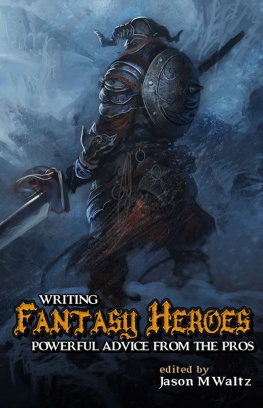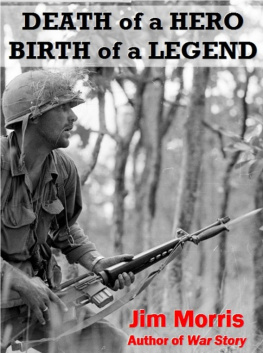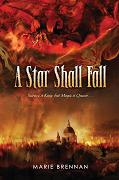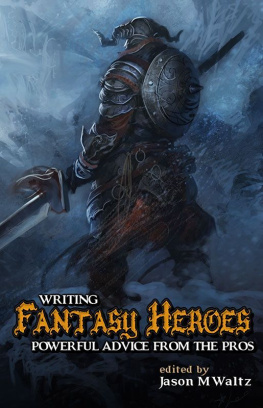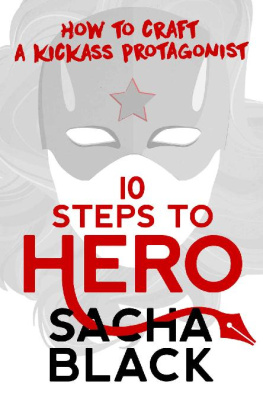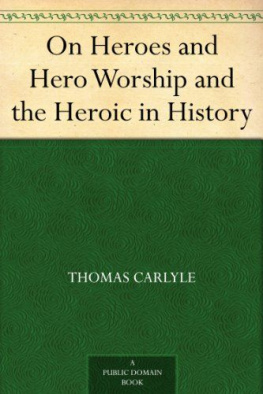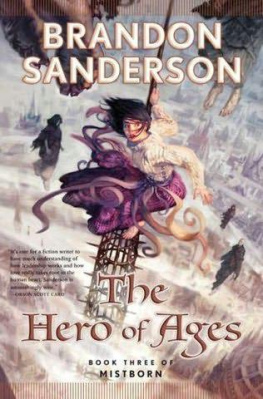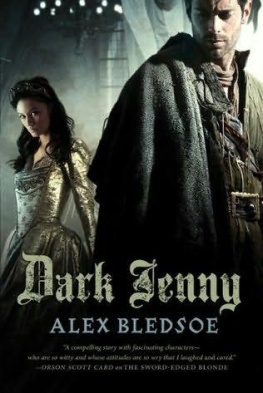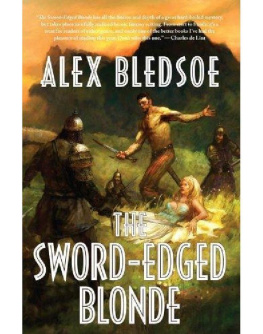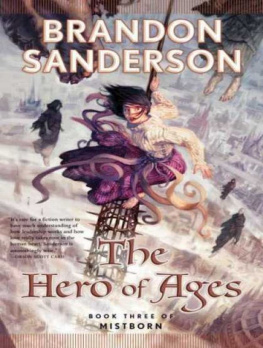HEROES
Where are your heroes? Are they trapped inside the stories in your head, eager to burst free? Are you ready to share them, to brag of them, to tell of their deeds and battles, their daring and sacrifice? Are you a storyteller ready to write the tales of your own heroes?
Fantasy heroes endure. They are embedded in our cultural fabric, dwarfing other literary figures and the mere men and women of history. Achilles and Odysseus, Gilgamesh and Beowulf. King Arthur and Robin Hood, Macbeth and Sherlock Holmes, Conan and Luke Skywalker. They dominate our legends, and tower over popular culture.
The stories we tell each other begin and end with fantasy heroes, and the 21st Century is as thoroughly captivated with them as ever. From Batman to Gandalf, Harry Potter to Tyrion Lannister, the heroes of fantasy speak toand forwhole generations.
But what makes a fantasy hero? How do the best writers create them, and bring them to life on the page? In WRITING FANTASY HEROES some of the most successful fantasy writers of our timeincluding Steven Erikson, Brandon Sanderson, Janet Morris, Cecelia Holland, Orson Scott Card, and Glen Cookpull back the curtain to reveal the secrets of creating heroes that live and breathe, and steal readers' hearts.
Whether you're an aspiring writer or simply a reader who loves great fantasy and strong characters, this book is for you.
Rogue Blades Presents
WRITING FANTASY HEROES
POWERFUL ADVICE FROM THE PROS
Foreword by
Steven Erikson
Contributions by
Alex Bledsoe
Jennifer Brozek
Orson Scott Card
Glen Cook
Ian C. Esslemont
Cecelia Holland
Howard Andrew Jones
Paul Kearney
Ari Marmell
Janet and Chris Morris
Cat Rambo
Brandon Sanderson
C. L. Werner
Edited by
JASON M WALTZ

MILWAUKEE WI
2013
Published by
Rogue Blades Entertainment
4068 S 60th Street, Suite 401, Milwaukee, Wisconsin 53220, USA
This is a collection of opinions containing writing advice and fictitious examples and citations. All the names, characters, places and events portrayed herein are either the product of the authors imaginations or are used fictitiously, and any resemblance to actual persons, living or dead, establishments, locales or incidents is purely coincidental. The publisher does not have any control over and does not assume responsibility for the content of author or third-party websites.
A Rogue Blades Presents Title
Writing Fantasy Heroes: Powerful Advice from the Pros
Copyright 2013 Rogue Blades Entertainment
ISBN: 978-0-9820536-9-0
Library of Congress Control Number: 2013932330
Cover Art: The Hunt, by Dleoblack
Cover Design: J.M. Martin
First Edition: February 2013
Printed and Bound in The United States of America
0 9 8 7 6 5 4 3 2 1
All rights reserved. No part of this publication may be reproduced, scanned, or distributed in any printed or electronic form without the prior written permission of the publisher and the individual authors, excepting brief quotes used in connection with reviews. Please do not participate in or encourage piracy of copyrighted materials in violation of any authors rights.
Copyright for individual works reverts to the individual authors and artists.
Man Up: Making your Hero an Adult, by Alex Bledsoe, 2012 by Alex Bledsoe.
NPCs are People Too, by Jennifer Brozek, 2012 by Jennifer Brozek.
The Reluctant Hero, by Orson Scott Card, 2012 by Orson Scott Card.
Shit Happens in the Creation of Story, Including Unexpected Deaths, with Ample Digressions and Curious Asides, by Glen Cook, 2012 by Glen Cook.
Foreword, by Steven Erikson, 2012 by Steven Erikson.
Taking a Stab at Writing Sword and Sorcery, by Ian C. Esslemont, 2012 by Ian C. Esslemont.
The Heroic Will, by Cecelia Holland, 2012 by Cecelia Holland.
Two Sought Adventure, by Howard Andrew Jones, 2012 by Howard Andrew Jones.
So You Want to Fight a War, by Paul Kearney, 2012 by Paul Kearney.
Tropes of the Trade, by Ari Marmell, 2012 by Ari Marmell.
The Hero in Your Blood, by Janet Morris and Chris Morris, 2012 by Janet Morris and Chris Morris.
Watching from the Sidelines, by Cat Rambo, 2012 by Cat Rambo.
Writing Cinematic Fight Scenes, by Brandon Sanderson, 2012 by Dragonsteel Entertainment, LLC.
Afterword, by Jason M Waltz, 2012 by Jason M Waltz.
MonstersGiving the Devils their Due, by C. L. Werner, 2012 by C. L. Werner.
Rogue Blades Entertainment
Putting the Hero back into Heroics!
Heroic Anthologies from RBE:
Return of the Sword
Rage of the Behemoth
Demons
~ ~ ~
To those who do things
Worth writing about,
Worth remembering,
Worth doing
~ ~ ~
Contents
Steven Erikson
Janet Morris and Chris Morris
Cecelia Holland
Ian C. Esslemont
Brandon Sanderson
Cat Rambo
Alex Bledsoe
Howard Andrew Jones
C. L. Werner
Jennifer Brozek
Ari Marmell
Paul Kearney
Glen Cook
Orson Scott Card
Jason M Waltz
Foreword
Steven Erikson
W hen asked for a single piece of advice for beginning writers, I reply with Finish what you start. It sounds simple, and for many, even obvious. But there is more to it, because writing is a learning process, and this process is unending. I would even go so far as to suggest that most of the learning takes place in the last third of whatever it is you happen to be writinga scene, a chapter, a novel, or a series.
There is a mindset at work here, and it needs to be approached with both humility and a kind of relentlessness. The act of creationin the telling of a storyimposes pressure on the writer, while the purpose behind that pressure is, ultimately, grace. In other words, the reader is witness only to the finished product, and if the making of that product entailed sweat and not a little blood, well, thats between the writer and her or his maker (or muse, if you prefer; or, indeed, the face in the mirror).
When I was starting as a writer of fiction, I pored over how-to books, from John Gardner to Eudora Welty, in search of secrets of the trade. Being young and inherently lazy, however, I made little effort to read between the lines. Now, years later, I have come to the belief that it is precisely between the lines that you will find the hard truths. They hide in the voice of the teacher, in the words they have put on the page.
Finish what you start. I voice it as a challenge, and let the silence hang. If the challenge in my tone makes the listener uncomfortable, well, good . It pays to be uncomfortable, especially as a writer. Uncomfortable with easy answers; uncomfortable with the process itself; uncomfortable with sage advice. Now, thats not quite the same as skepticism, or disdain. To be made uncomfortable means that something got through, something stuck, and now you have to start worrying it. That may be irritating, distracting, whatever. And youre free to dismiss it. But if you cant get rid of it, you have no choice but to think about it.
Words of advice are freely giventhe authors in this book each sat down, prepared to talk about process and the creation of heroes, and talk they have, offering up many of the hard-learned lessons they each have won in their writing careers.
But I would advise: look between the lines. These are confessions of hard work, of contemplation, of the struggle to find grace, and finally, of the distillation that comes when you finish what you startthose moments in the writing of a tale, when you can see the end, when every sentence is like skinning your knuckles, when from all the sweat and day-in-day-out grind you stumble upon realizations, glimmers of comprehension, when you find yourself in slow revelation. Thats what this was all about. I wasnt sure. I didnt know for a fact. Ive been looking, tracking it down, hunting signand here it is.
Next page
